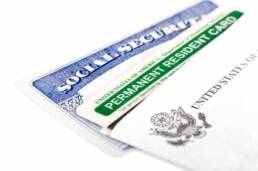One of the underlying rationales driving immigration policy in the United States is family unity. The law allows U.S. citizens to petition for certain qualified relatives. If approved, this petition would permit a spouse, unmarried child under the age of 21 or a parent to come and live permanently in the U.S. These immediate relatives have special immigration priority and do not have to wait in line for a visa number. There are an unlimited number of visas available to them.
Two pathways exist for the spouse of a U.S. citizen in obtaining status as a legal permanent resident. The first is through adjustment of status. This can only be done if the nonimmigrant spouse is inside the United States. It involves filing a Form I-485 (Application to Register Permanent Residence or Adjust Status), Form I-130 (Petition for Alien Relative), submitting an affidavit of support and attending a green card interview. The second pathway is through consular processing, and this is done when the spouse of a U.S. citizen is living outside the country.
The two marriage-based green card pathways are fairly similar. In both cases, the U.S. citizen spouse must file Form I-130, and that form is processed by USCIS. Evidence must also be submitted with the I-130 detailing the couple’s relationship; i.e. how you fell in love, how you met, etc. Next, a green card interview is conducted, and USCIS officers will try to determine the authenticity of the relationship.
What happens, however, if during this process something goes wrong? What happens if a sponsoring spouse gets angry and withdraws the I-130 for the immigrant spouse? The answer is simple. Once the petition is withdrawn, it is ultimately denied and there is no way to reinstate that specific application. This goes for any immigrant petition. If all is eventually forgiven and a couple decides to get back together, an entirely new immigrant visa petition with fee must be filed. Processing for this application will also re-start entirely.
There are other consequences that flow from withdrawing an I-130 application as well. First, the next green card interview will most likely be tougher. The interviewer will be naturally skeptical and curious as to why the first marriage did not last and why things are different this time around. Second, adjustment of status can be denied if an officer believes that the immigrant’s actions led to the withdrawal of the first petition. This is because I-485 applications are discretionary. For example, adultery by the immigrant spouse may lead to a denial, unless the spouse can show some sort of rehabilitation. If the adjustment of status petition is denied based on discretion, it is possible for the I-130 to still be approved. However, the immigrant may have to consular process the application.
If you are interested in applying for a marriage-based or family-based green card and would like to explore your options, please contact our office to schedule a consultation with one of our attorneys today!
Ready to have Berardi on your side?
Whether you’re a business looking to hire or a professional hoping to relocate, immigration law can be complicated. But you don’t have to do it alone. Put our experience to work for you.



